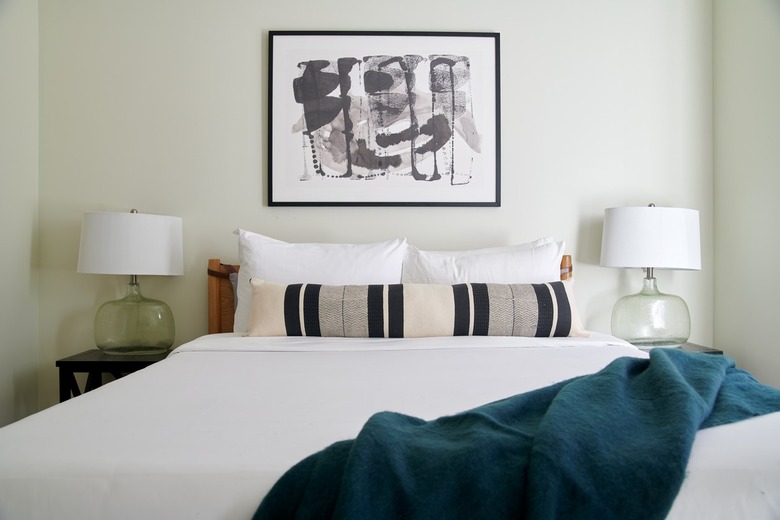This Is The Best Way To Wake Up In The Morning, According To Sleep Experts
Sometimes, waking up in the morning after a restful slumber can be a challenge — especially if you're cozy under a layer of warm blankets and woken by an earsplitting alarm clock. However, most of us need that blaring sound in order to begin our day on time.
If you've ever wondered if there's an alternative to an alarm, you're not the only one. So, we asked experts all the questions you may have been pondering about the healthiest way to wake up in the morning. Keep reading to find some answers — and keep these tips in mind for your sleep routine this year.
Is it bad to use your phone as an alarm clock?
Is it bad to use your phone as an alarm clock?
Let's start with the most popular method of waking up — using an alarm clock, particularly one on your phone that blasts a ringtone to jolt you awake. Though effective, loud alarms aren't ideal for your health.
"The jarring sound of an alarm can be problematic, leading to spikes in cortisol levels and triggering the stress response system," sleep psychologist Dr. Samina Ahmed Jauregui, an advisor to Pluto Pillow, tells Hunker. If this happens at an inopportune time during your sleep cycle — say, during deep sleep — it could lead to a condition called sleep inertia.
"Consequences of sleep inertia include poor decision making, slowed reaction time, bad mood, feelings of disorientation and confusion, and fatigue, which may impact our health," says Dr. Jauregui.
Plus, placing your phone on your nightstand might decrease the quality of your sleep in other ways.
"Keeping cell phones nearby makes it harder to resist using them in bed, also delaying how long it takes you to fall asleep or return to sleep," says Dr. Jauregui. You may also find yourself "clock watching," or constantly checking the time to see how much longer you have to sleep, which can cause anxiety.
These negative effects aren't limited to cell phone alarms — tabletop alarm clocks that rely on sound to wake you can also be detrimental to your sleep routine. And if you have a digital alarm clock, the glow at night might disrupt your sleep as well.
What's the best way to wake up in the morning?
What's the best way to wake up in the morning?
In an ideal world, you wouldn't use an alarm clock at all! Humans' natural circadian rhythm typically makes people sleepy when it's dark out and alert when it's bright out.
"Sunlight signals to the brain that it should be awake, and no light signals to the brain that it should be asleep," Dr. Chelsie Rohrscheib, head sleep specialist and neuroscientist at sleep health company Wesper, tells Hunker. "If left uninhibited by alarms and artificial light, humans would naturally wake up with the sun once the brain has determined that it achieved enough sleep the night before."
That means you'd wake up feeling totally refreshed after your final sleep cycle — no alarms necessary. Of course, that's not always an option, especially if you have places to be in the morning, like work or school.
For a less jarring wake-up call, use light instead of sound. "Opening up the curtains or blinds to allow natural light into the room, turning the room light on, or using a light-based alarm clock that glows brighter as it gets closer to wake time are all alternatives," certified sleep coach Ryan Fiorenzi, founder of StartSleeping.org, tells Hunker. More specifically, he recommends setting your blinds to open at a specific time with a timer.
If light isn't enough to rouse you in the morning, there are ways to make sound-based alarms better for your body and brain. "If you must use an alarm clock, I recommend waking to pleasant music that slowly builds in volume over several cycles," says Fiorenzi. "Try to find a song that has an up-tempo beat and a positive message. The song you select can help to frame your positive state of mind for the rest of the day."
How can you wake yourself up without an alarm clock?
How can you wake yourself up without an alarm clock?
It's absolutely possible to train yourself to wake up naturally without any alarms, but it takes time and effort. As you regulate your circadian rhythm, you'll find that you'll start waking up unprompted at the same time every day. That said, you might have to use alarms to train your body to accomplish that goal.
"The key to waking up naturally without an alarm is to consistently go to sleep and wake up at the same time for at least a month," says Fiorenzi.
Dr. Rohrscheib suggests additional training methods beyond a regular bedtime and wake time.
"Go to bed at a time that will allow you to get at least seven to nine hours of sleep so that you can wake up at an appropriate time without sleeping in," she says. "You may need to incorporate other behaviors that will help regulate your circadian rhythm, like getting plenty of light exposure in the mornings, daily exercise, eliminating caffeine in the afternoons, and limiting your light exposure to the minimum before you go to bed."
Here's to a smoother sleep routine.

